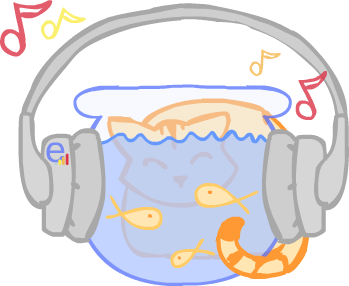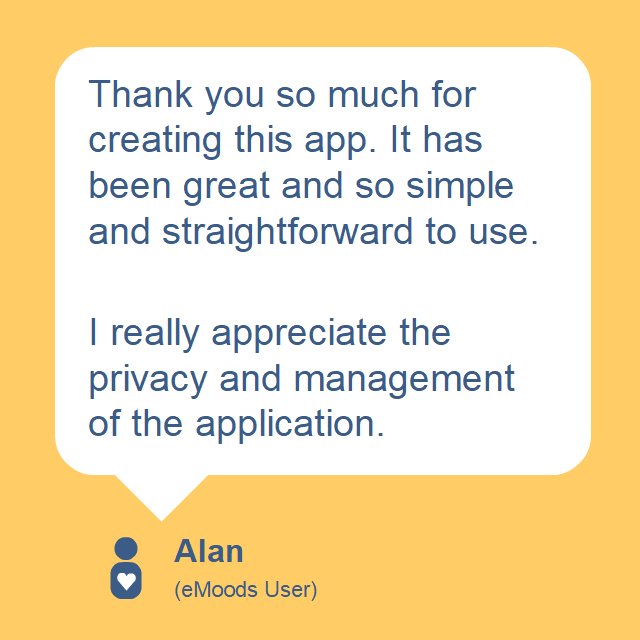
The eMoods Blog Is Now Featuring Guest Posters
We’re excited to announce that we’re starting to feature guest posters on the eMoods Blog. This month, we have two featured posters and we’re excited to share their stories:
We’re excited to announce that we’re starting to feature guest posters on the eMoods Blog. This month, we have two featured posters and we’re excited to share their stories:
How eMoods Aided My Recovery And Inspired My Data Science Career
Drawing inspiration from hand-drawn journal mood logging and the data she’d been collecting in eMoods, Liz Roten of St. Paul, Minnesota, took her health tracking one step further than most of us-- she created visually stunning representations of her mood logs.
So when a university project challenged her to learn more about data analysis tools and how to present visual representations of that data, she chose her own mental health as the subject. The project, which broke down her mental health status by location, symptom, and time of year, seeded her amazing portfolio and landed her a job as a data scientist.
So when a university project challenged her to learn more about data analysis tools and how to present visual representations of that data, she chose her own mental health as the subject. The project, which broke down her mental health status by location, symptom, and time of year, seeded her amazing portfolio and landed her a job as a data scientist.
If I Look Fine, That’s How You Know I’m Not
When Zach Alwin of Long Beach, California, started Roet on New Years Eve 2017, he didn’t have much of an idea what he wanted to say with it; he was looking for an outlet to cope after a third friend of his completed in suicide within as many years.
When Roet’s songs- an alternative electronic music project- seemed to help his other friends deal with the loss, Zach- the artist, teacher, and musician- pretty quickly found a voice for Roet by focusing on issues around mental health.
Listen to Roet’s song “If I Look Fine, That’s How You Know I’m Not”
---
More stories coming, consider telling yours!
We have more guest posts in the making, and we would be thrilled to share yours, too (even if you’ve never used eMoods). You don’t even have to use your real name! Just reply to this email and let us know if you’d like to do a post.
When Roet’s songs- an alternative electronic music project- seemed to help his other friends deal with the loss, Zach- the artist, teacher, and musician- pretty quickly found a voice for Roet by focusing on issues around mental health.
Listen to Roet’s song “If I Look Fine, That’s How You Know I’m Not”
---
More stories coming, consider telling yours!
We have more guest posts in the making, and we would be thrilled to share yours, too (even if you’ve never used eMoods). You don’t even have to use your real name! Just reply to this email and let us know if you’d like to do a post.

Animal Therapy Through Fostering
Ever consider fostering a homeless pet? Find yourself at home more often than not because of COVID-19? If ‘yes’ is the answer to both of these questions, then it’s time to act. There has never been a better time than now to foster, for you and for them.
With billions of people isolating at home, the potential boost in wellbeing- for both people and pets- is huge, and fostering provides a safety net for finances and emergencies while allowing you to reap the benefits of companionship.
The mental and physical benefits of having a pet have been long documented -- for a thorough summary, take a look at HelpGuide.Org’s article titled ‘The Health and Mood-Boosting Benefits of Pets’.
Sound too good to be true? Just ask any animal rescue professional what the most needed resource is in their field and they’ll say ‘good foster homes’. The one-on-one attention of a foster family is the next best thing to a forever family.
Because foster homes are so crucial in proper animal rescue, organizations go to great lengths to make it as easy as possible. You’ll want to confirm with your local shelter, but most legitimate organizations will:
With billions of people isolating at home, the potential boost in wellbeing- for both people and pets- is huge, and fostering provides a safety net for finances and emergencies while allowing you to reap the benefits of companionship.
The mental and physical benefits of having a pet have been long documented -- for a thorough summary, take a look at HelpGuide.Org’s article titled ‘The Health and Mood-Boosting Benefits of Pets’.
Sound too good to be true? Just ask any animal rescue professional what the most needed resource is in their field and they’ll say ‘good foster homes’. The one-on-one attention of a foster family is the next best thing to a forever family.
Because foster homes are so crucial in proper animal rescue, organizations go to great lengths to make it as easy as possible. You’ll want to confirm with your local shelter, but most legitimate organizations will:
- Provide necessary supplies (food, toys, litter, medication, etc)
- Match you with a foster pet you can handle, so you’re not overwhelmed
- Take a foster back into care if your circumstances change
- Provide behavioral and medical consultation
- Cover medical care through their approved veterinarians (within the limitations of their budget)
For those of us allergic to cats and dogs, there are a lot of other options! Rabbits, rodents, birds, reptiles...even fish!
Ready to get started? For people in the U.S., we recommend taking a look at the Best Friends Network: Read Up On Becoming an Animal Foster Parent
---
Adulting: the Personal Life Edition of Imposter Syndrome
The Oxford Languages definition of ‘adulting’ reads: ‘the practice of behaving in a way characteristic of a responsible adult, especially the accomplishment of mundane but necessary tasks’, but that doesn’t really cover the anxiety-riddled significance that ‘adulting’ means to my generation.
A quick image search for ‘adulting comics’ will explain everything you need to know, but a work-safe guaranteed nutshell version is just a click away in this XKCD web comic.All the markers for imposter syndrome are there; someone is, as far as any observer is aware, doing the things they’re supposed to with (reasonable) competence despite an internal dialogue of disbelief and self-doubt.
And it feels like a generational affliction. We, who have no idea what we’re doing, are getting away with fooling everyone into thinking we’re adults by actively practicing adulting. As I see it, the only difference from ‘imposter syndrome’ is that the setting is one’s personal daily life.
Wait, what’s imposter syndrome, again?
By definition, imposter syndrome is the anxious belief that one is not as competent, intelligent, or capable as co-workers and peers perceive one to be; to think oneself a fraud, a phony, an imposter.
Imposter syndrome is usually discussed in relation to an academic or professional setting- it was, after all, coined in a 1978 peer reviewed medical journal by two women acutely feeling its effect.It’s 2021, and while I doubt I’m the first to make the connection, I would like to formally introduce you to the personal life manifestation of imposter syndrome: ‘adulting’, and, just like imposter syndrome, there are ways to conquer it.
By Kate from the eMoods Team
A quick image search for ‘adulting comics’ will explain everything you need to know, but a work-safe guaranteed nutshell version is just a click away in this XKCD web comic.All the markers for imposter syndrome are there; someone is, as far as any observer is aware, doing the things they’re supposed to with (reasonable) competence despite an internal dialogue of disbelief and self-doubt.
And it feels like a generational affliction. We, who have no idea what we’re doing, are getting away with fooling everyone into thinking we’re adults by actively practicing adulting. As I see it, the only difference from ‘imposter syndrome’ is that the setting is one’s personal daily life.
Wait, what’s imposter syndrome, again?
By definition, imposter syndrome is the anxious belief that one is not as competent, intelligent, or capable as co-workers and peers perceive one to be; to think oneself a fraud, a phony, an imposter.
Imposter syndrome is usually discussed in relation to an academic or professional setting- it was, after all, coined in a 1978 peer reviewed medical journal by two women acutely feeling its effect.It’s 2021, and while I doubt I’m the first to make the connection, I would like to formally introduce you to the personal life manifestation of imposter syndrome: ‘adulting’, and, just like imposter syndrome, there are ways to conquer it.
By Kate from the eMoods Team
